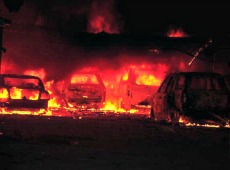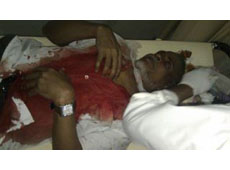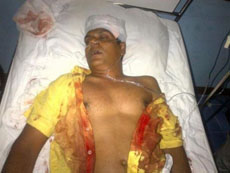Additional reporting by Ahmed Nazeer, Neil Merrett and Mariyath Mohamed.
Police have arrested Azleef Rauf, the Maldives National Defence Force (MNDF) officer accused of planning the murder of MP Dr Afrasheem Ali by suspect Hussein Humam, who yesterday (May 22) confessed to the crime after earlier denials.
Azleef was arrested as part of an ongoing investigation, however a police spokesperson who requested anonymity would not confirm if his detention was related to the murder of Dr Afrasheem.
Police confirmed a request had also been made for authorities to confiscate the passports of “some” individuals as part of its investigations, but would not reveal the identities or number of suspects facing travel bans.
Immigration Controller Dr Mohamed Ali told Minivan News that Abdulla ‘Jaa’ Javid, Adam ‘Spy’ Solah and Shahin Mohamed were now facing travel bans, but added that their passports had not be confiscated.
The three individuals were on Wednesday accused by Humam of involvement in Afrasheem’s death.
Javid, son-in-law of opposition Maldivian Democratic Party (MDP) Chairperson ‘Reeko’ Moosa Manik, was arrested by police in December 2012 in connection with the case, and was released 45 days later.
According to local media reports of the hearing in the Criminal Court yesterday, Humam alleged that the idea of killing Dr Afrasheem was given to him by Maldives National Defence Force (MNDF) officer Azleef Rauf, whom he met at a baibalaa tournament in 2012.
Humam, the statement and the court hearing
Minivan News spoke to Criminal Court Media Official Ahmed Mohamed Manik regarding the sequence of the court hearing, which was widely reported by local media after the chief suspect confessed.
According to Manik, after the state presented evidence – which included bloodstained jeans forensically linked to Dr Afrasheem – Humam declared that he “did not have anything more to say.”
“The judge then inquired of him whether he was accepting the charges or denying them, to which Humam said that he confessed to having partaken in the planning and the execution of the murder,” stated Manik.
In an earlier hearing, Humam denied specifically murdering Dr Afrasheem, however he did confess in court to several other murders, stabbings and robberies.
During yesterday’s hearing, after the judge asked Humam to provide details, “he responded that he had already given a detailed statement previously,” said Manik.
“The judge again asked if Humam was referring to the statement he had given to the police, or the one he had given at a court hearing to which he was brought to extend his detention,” he said.
“Humam said it was the one given in the detention extension hearing. I am not sure which one of the detention extension hearings it was that he gave that statement in, whether it was the first one or some later one. Either way, the judge then asked the state prosecutors to read out the statement, as they had already submitted this among the evidence,” said Manik.
“Humam was not asked to read it as it was such a long statement and it would take too much time. Once the statement was read out, he confirmed that it was the one that he had given before,” Manik stated.
“Humam repeatedly insisted that he did not want a lawyer. He confessed to having participated in planning and carrying out the killing. He did not add details after the statement. He just confessed, confirmed the statement that was read out was the one he had given before, and repeatedly stated he did not want a lawyer.”
According to the statement read out in court, Humam was invited to coffee with Azleef, Javid and his brother ‘Jana’, during which Azleef allegedly said “I promise you will get MVR4 million if you murder Dr Afrasheem,” to which Javid’s brother ‘Jana’ replied “yes you will.”
According to the statement, he later met with Azleef and a person called ‘Spy’, and asked them why he had to attack Afrasheem. Their reply was that one of the reasons they had to attack Dr Afrasheem concerned remarks he had made the day former President Mohamed Nasheed controversially resigned.
Rauf and Javid were also previously detained by police over their alleged involvement in the case. Both were later released by the court.
Javid spent 45 days in detention in connection to the Afrasheem murder, after which time his lawyer argued his continued detention was unconstitutional given there was no evidence to support keeping him in custody.
On the day of Javid’s release (January 17), his brother Shahin Mohamed was arrested by police while he was waiting with the rest of Javid’s family outside the court. Mohamed was released from police custody three hours after he was detained.
An MDP activist Mariyam Naifa was also arrested several days following the murder, and was subsequently released. Her lawyer at the time said she was arrested in connection to intelligence received by police in the Afrasheem case.
Motive
The government and police have maintained that Dr Afrasheem’s death was politically motivated.
However, others have sought to ascribe religious motives to the killing, as noted in the US State Department’s 2012 report on religious freedom.
“One of the more prominent theories about his murder was that violent extremists viewed Afrasheem’s very public moderate approach to Islam as apostasy and killed him to send a message to moderate Muslims that a strict interpretation of Islam was the only acceptable approach. The case remained under investigation at year’s end, with one person charged in the murder,” the report noted.
Afrasheem was murdered outside his house shortly after appearing on a religious television program in which he insisted that he had never ever spoken of anything regarding religion which was not stated in the Quran or sayings of the Prophet (PBUH), and asked for forgiveness from citizens if he had created a misconception in their minds due to his inability to express himself in the right manner.
http://www.youtube.com/watch?feature=player_embedded&v=1IGDhGmKnVU
The scholar and MP was attacked several times in 2008, including being hit in the head with a stone on May 27 on his way home from work, and was assaulted after he finished Friday prayers as an Imam in the Ibrahim Mosque in January. His car window was smashed while he was driving through Male’ on March 18, 2012.
The murdered MP was also formerly Parliament’s member of the Judicial Services Commission (JSC), until he was replaced in mid-2011 by Jumhoree Party (JP) Leader, resort tycoon Gasim Ibrahim.
Immediately following Dr Afrasheem’s murder, President’s Office Press Secretary Masood Imad sent an SMS to foreign media outlets declaring that “Nasheed’s strongest critic Dr Afrasheem has been brutally murdered.”
Following Humam’s court appearance yesterday, Masood tweeted that the government was “concerned about the close relationship of Mr Javid to former President [Mohamed Nasheed].
Government is concerned about the close relationship ofMr. Javid to former President @mohamednasheedwe are watching the case closely.
— Masood Imad (@MasoodImv) May 22, 2013
Tourism Minister Ahmed Adheeb meanwhile tweeted following the hearing that he was “Shocked and Saddened by the news of the confession of Dr. Afrasheem murderer, confirming that he was brutally killed for a political reason”.
Shocked and Saddened by the news of the confession of Dr. Afrasheem murderer, confirming that he was brutally killed for a political reason
— Ahmed Adeeb (@Ahmed_Adeeb) May 22, 2013
Former Justice Minister, Home Minister at the time of Dr Afrasheem’s death and now the PPM’s vice presidential candidate Dr Mohamed Jameel, tweeted: “Dr Afrasheem was assassinated for political purpose , says the suspect”.
Dr Afrasheem’s murderer reveals those behind this crime.The nation is shocked with this revelation , wonder will they say now! — Mohamed Jameel Ahmed (@MJameelAhmed) May 22, 2013
Police Commissioner Abdulla Riyaz has publicly dismissed the rumours that the murder was linked to religious fundamentalists, stating “no evidence has been gathered suggesting that this murder was carried out for a religious motive.”
Minister of Islamic Affairs Sheikh Shaheem Ali Saeed also disputed a religious motive in Afrasheem’s murder, telling local media that the Islamic Ministry had not forced the scholar to offer a public apology for anything in his last television appearance.
Shaheem went on to say that Afrasheem had been given the opportunity to appear on the show following a series of requests made by the murdered scholar. He said Afrasheem had asked for the opportunity on Monday’s (October 1. 2012) program, and so the previously arranged guests had been replaced with him.
Shaheem also said that Afrasheem had visited the Ministry of Islamic Affairs the same afternoon, requesting a discussion on the topics to be covered in the talk show.
Shaheem furthermore said that in this meeting, Deputy Minister of Islamic Affairs Mohamed Gubadh AbuBakr, Afrasheem and himself had spoken about how religious disagreements had led to rifts between close friends, and said that he wanted to “escape from all of this”.
“[Afrasheem] said that he wanted everyone to know what his viewpoints were. And [he] wanted to share this on a channel watched by the largest audience,” said Shaheem, sharing his discussion with Afrasheem in their last meeting together.
“I think this is a highly esteemed position that Allah has granted [Afrasheem] in timing this program in the midst of all that happened that night. It is fate that the show was arranged for the very night,” Shaheem said.
In May 2012, Shaheem’s Adhaalath Party put out a press release “condemning in the harshest terms” remarks made by two unnamed scholars in a lecture to police officers that the party contended “mocked” the Sunnah (way of life prescribed as normative for Muslims on the basis of the teachings and practices of Prophet Mohammed).
A police media official confirmed that the session was conducted by Dr Ibrahim Zakariyya Moosa and the late Dr Afrasheem.
“In his speech, Dr Afrasheem Ali mainly explained the importance of knowing how the Prophet’s Sunnah is ranked,” read the police news item.
MP Afrasheem argued that issues on which scholars have not been able to reach a consensus could not be declared either compulsory or heretical as “there cannot be a definite conclusion regarding such problems.”
However, according to Adhaalath Party, one of the scholars told police officers that there was no benefit to society from an individual wearing a beard “even if, for example, it was established from the Prophet’s Sunnah.”
“As some officers of the Maldives police institution wanted to wear beards, he attempted in his talk to convince them that there was no need to do something that was of no benefit to society,” the party said.
“Desperate attempt”: MDP
While unable to confirm if Javid or any other members of the party were among those whose passports had been confiscated, the former President’s MDP alleged the handling of the case by police was a “desperate attempt” by the government to frame the party and discredit it ahead of the presidential elections in September.
MDP MP and Spokesperson Hamid Abdul Ghafoor claimed that the party was “totally shocked” at what he alleged were attempts to implicate its supporters in the murder of a “liberal religious scholar”.
“We believe this is very much related to trying to absolve religious fundamentalists of the crime,” he said.
Ghafoor claimed that the public were skeptical of the direction of the police investigation into Dr Afrasheem’s death, given that President Dr Mohamed Waheed had come to power in a “coup d’etat”.
“This coup administration has lost all credibility in the eyes of the public. No one believes their scaremongering,” he said.
“We are concerned at these attempts of election-time intimidation.”
Ghafoor claimed that the entire investigation into Dr Afrasheem’s murder was tainted by wide-scale public distrust in the police.
“They are trying to cover up the case desperately, and yet it is during their watch that we are seeing so many murders occurring,” he said.
Ghafoor added the MDP were awaiting developments in the police investigation, while preparing to host protests across the country on Saturday (May 25) raising concern about judicial bias and a lack of law and order.
Masood Imad rejected allegations the government was involved in the direction of investigations into the murder, claiming that the police and judiciary were dealing with the matter.
“We have continued to say that we will not interfere with the country’s judiciary,” he said. ” We are just sitting and watching how the case develops.”
 Commissioner Riyaz briefed the Gang Task Force on Wednesday, following his comments to local media the previous day.
Commissioner Riyaz briefed the Gang Task Force on Wednesday, following his comments to local media the previous day.



